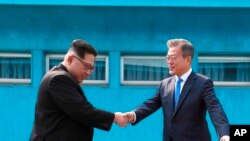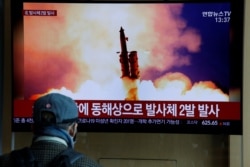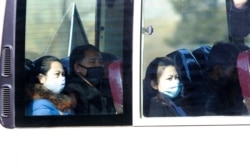North Korea is sending mixed messages to South Korea in the age of the coronavirus: Earlier this week, Pyongyang conducted its first short-range ballistic missile test in more than three months, then broke its hostile silence by sending well-wishes to the South Korean president.
North Korean leader Kim Jong Un penned a letter to South Korean President Moon Jae-in Wednesday, expressing concern for Moon’s health and wishing him luck in battling the nationwide COVID-19 outbreak. South Korea has at least 6,284 confirmed cases of the virus as of midafternoon March 6, and 42 deaths. Meanwhile, North Korea claims to have zero cases.
Pyongyang’s latest mixed signals are perplexing for North Korea analysts, who can only guess why Kim Jong Un would both conduct hostile launches and send warm regards in a matter of days.
“It’s strange behavior. I mean, it’s weird, and I just can’t fully explain it,” said Peter Ward, a researcher on the North Korean economy and writer for NK News. “The missile test is probably a signal of displeasure on the alliance front with the U.S., and the letter to Moon is more about setting corona-related mood music. But I’m not entirely sure what’s going on — it doesn’t really make sense to me.”
South Korea condemned the March 2 missile launches, expressing “strong regret” for North Korea’s actions. Kim Jong Un’s sister, Kim Yo Jong — who met President Moon personally during the height of diplomacy at the 2018 Pyeongchang Winter Olympics — fired back, accusing South Korea of acting like a “frightened dog barking.”
“Training is the basic mission of the army responsible for the defense of the country and is an action for self-defense,” she said in a signed statement March 3. “The drill was not aimed to threaten anybody.”
Experts can only speculate why Kim Yo Jong decided to downplay the launch of short-range ballistic missiles, which have been used as a tool for turning up political pressure on adversaries like South Korea and the United States in the past.
“[North Korea] could be trying to normalize rocket tests — the idea that, basically, North, they think these activities should be treated as normal and not problematized by the international community,” Ward said. “They are hoping that, if they keep doing them, they will no longer be newsworthy.”
Last August, President Donald Trump strayed from the typical U.S. response of condemning short-range missile tests, stating that he had “no problem” with them and that they were “very standard.”
On the other hand, some experts believe the missile launch is a way for North Korea to flex its strength while preparing the ground for future international aid.
“Recent military exercises and his sister‘s tough comments about South Korea could be intended to shore up domestic political strength before Pyongyang makes a quiet bid for international assistance,” Leif-Eric Easley, an associate professor of international studies at Ewha Womans University in Seoul, told VOA News.
Currently, North Korea claims that it is free of COVID-19 coronavirus cases, though some have begun to speculate otherwise. North Korea closed its borders to neighboring countries and barred foreigners from entering the country in February. Despite the tight restrictions, Kim Jong Un’s recent letter to Moon might be a sign that Pyongyang needs help — and soon.
“Kim’s letter to Moon may set up the claim that he offered assistance to Seoul first,” Easley said. “Then, when North Korea accepts a bunch of masks and testing kits, his propaganda machine can call it a show of appreciation for Pyongyang’s leadership in countering the virus.”
“It’s fair to guess that these letters are angling for aid,” Ward said. “Relations between the two Koreas were really bad before these letters — it was one side, North Korea, basically slapping the other in the face over and over again.”
“It indicates that things are not going so good on their side — much worse than what they’re letting on,” Ward added. “But I guess we will all have to wait and see.”






